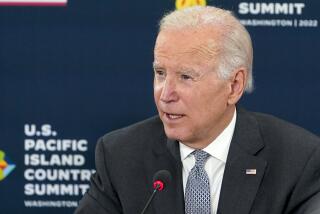Finance Officials Back IMF Bailout Role
SEOUL â A plan to cope with future economic crises in Asia won endorsement Wednesday from deputy finance ministers gathered in Manila, setting the stage for further discussion next week at a Pacific Rim summit in Vancouver.
A communique issued by the group called for a âcooperative financing arrangementâ that would maintain the âcentral roleâ of the International Monetary Fund in setting the terms for any rescue packages. The proposed arrangement would not have any standing pool of bailout funds but would be organized to provide credit lines quickly if needed.
The agreement on a central role for the IMF represents a victory for Washington, which resisted earlier calls for a distinct so-called Asia fund that might enable troubled economies to get bailed out without adhering to the kind of strict reforms demanded by the IMF in return for money.
The tentative agreement envisions bailouts similar to the multibillion-dollar IMF-led packages arranged this year for Thailand and Indonesia after their currencies plunged. In those rescue efforts, the IMF set strict terms for financial reforms and provided some funds, but other nations also provided direct loans or backup credits.
âDeputies agreed on the need and desirability of a framework for regional cooperation to enhance the prospects for financial stability,â the statement said.
The meeting, attended by Asian deputy finance ministers, U.S. Deputy Treasury Secretary Lawrence Summers and top IMF and World Bank officials, endorsed several broad âinitiativesâ that will be fleshed out after discussion in Vancouver by heads of state and other officials attending the 18-member Asia-Pacific Economic Cooperation forum. The initiatives include creation of a formal structure for Asian nations to monitor one anotherâs economic performance and policies, with the goal of heading off potential problems--such as overvalued currencies--that could spill across national borders.
Philippine President Fidel Ramos, who organized this weekâs meeting in Manila, said he will seek the support of President Clinton and other APEC leaders for the proposed Asian financing arrangement since the impact of Asiaâs financial problems extends far beyond Southeast Asia.
âOutsiders must also help because everybody in the region is a victim of sorts,â Ramos said.
Ramos, who was in San Francisco to give a speech en route to the APEC conference, said the Manila agreement was very preliminary and did not spell out exactly how the proposed âcredit lineâ would operate, who would participate or what they would contribute.
He said the proposed Asian financing mechanism should not be regarded by any Asian leader as an excuse to avoid implementing the painful reforms necessary to win back international confidence.
âItâs not easy money, but money ready to help out someone under exceptional circumstances,â he said.
The Manila plan emerged from a proposal for an âAsian Monetary Fundâ that was first discussed this summer and backed by Japan. The United States quickly objected to any independent fund that might undercut the IMF. The plan drawn up in Manila thus appears to be a compromise that appeals to both Washington and Tokyo.
âWe were skeptical if agreement could be reached in Manila,â said a Japanese Foreign Ministry official, who spoke on condition of anonymity. âBut this result came out . . . and the U.S., the IMF and the World Bank have agreed to join. I am sure the prime minister will welcome this news too.â
The official said he expects the Manila proposal to be discussed at the APEC summit and that members will be supportive of it.
In addition to the recent turmoil in Asian currency markets, which is certain to be discussed at least informally in some form, trade liberalization--one of APECâs most fundamental goals--will be a key topic.
Washington is expected to push for an APEC effort to liberalize rules governing electronic commerce and agricultural biotechnology.
*
Holley reported from Seoul and Iritani from San Francisco. Etsuko Kawase of The Timesâ Tokyo bureau also contributed to this report.
More to Read
Sign up for Essential California
The most important California stories and recommendations in your inbox every morning.
You may occasionally receive promotional content from the Los Angeles Times.










